Regional leadership - Health Sciences - Curtin University of ...
Regional leadership - Health Sciences - Curtin University of ...
Regional leadership - Health Sciences - Curtin University of ...
Create successful ePaper yourself
Turn your PDF publications into a flip-book with our unique Google optimized e-Paper software.
A MAGAZINE FOR BUSINESS AND ALUMNI<br />
review<br />
CURTIN BUSINESS SCHOOL<br />
CURTIN UNIVERSITY OF TECHNOLOGY WESTERN AUSTRALIA<br />
JUNE 2008<br />
<strong>Regional</strong> <strong>leadership</strong><br />
Enabling social change across Asia Pacific<br />
Truly international<br />
Taking <strong>Curtin</strong> Business School to the next level<br />
Valuing the workplace<br />
Retaining staff without the dollars
PROFESSOR DUNCAN BENTLEY<br />
EDITORIAL<br />
Local efforts, global effects<br />
When I arrived to take up my position<br />
at CBS as Pro Vice-Chancellor earlier<br />
this year, I knew I was joining many talented<br />
people who are involved in a range <strong>of</strong><br />
projects, across Australia and around<br />
the world.<br />
In this issue, you can read about the ten<br />
million dollar AusAID <strong>leadership</strong> project,<br />
led by Janet Sutherland. This project is a<br />
milestone for CBS and <strong>Curtin</strong> – its largest<br />
government contract was won in open tender<br />
in competition with the cream <strong>of</strong> Australia’s<br />
business schools. Winning our first<br />
nation-wide executive education project<br />
confirms our front-runner status in <strong>leadership</strong><br />
training. It demonstrates the seamless<br />
collaboration across CBS (between GSB,<br />
Executive Education and Consultancy),<br />
across <strong>Curtin</strong> (the Centre for International<br />
<strong>Health</strong> and the International Office) and with<br />
third parties (Australian Experiential Learning<br />
Centre and TeamWorks) – an essential<br />
attribute as CBS takes its place in the front<br />
rank <strong>of</strong> the region’s innovative business<br />
schools. Winning and successfully executing<br />
this project is a tribute to many talented and<br />
committed people across the university.<br />
Another example <strong>of</strong> CBS working at the<br />
global level is a story about alumni member<br />
Trevor Goddard, now working at <strong>Curtin</strong>’s<br />
School <strong>of</strong> Occupational Therapy. Trevor<br />
coordinates a program placing <strong>Curtin</strong> health<br />
care students in positions within less<br />
developed countries such as Africa, Ukraine,<br />
and China.<br />
A story highlighting the practical outcomes<br />
<strong>of</strong> our work is that <strong>of</strong> Tony Travaglione from<br />
the School <strong>of</strong> Management, helping drive<br />
an innovative ARC project involving one the<br />
State’s biggest agencies, Main Roads WA.<br />
Tony and the Main Roads <strong>leadership</strong> team<br />
have successfully introduced a values based<br />
management initiative, helping staff re-think<br />
the way they approach their work.<br />
Finally, I would like to say how delighted<br />
I am to join the CBS team. I believe the<br />
quality <strong>of</strong> our people and the excellent<br />
reputation <strong>of</strong> CBS form a solid foundation for<br />
us to take the school to the next level within<br />
the region and indeed – as these stories<br />
show – to all corners <strong>of</strong> the globe.<br />
Pr<strong>of</strong>essor Duncan Bentley<br />
Pro Vice-Chancellor<br />
<strong>Curtin</strong> Business School<br />
2 review JUNE 2008 CURTIN BUSINESS SCHOOL<br />
inreview<br />
JUNE 2008<br />
cover story<br />
4 <strong>Regional</strong> <strong>leadership</strong><br />
Enabling social change across the Asia Pacific<br />
features<br />
6 Valuing the workplace<br />
Adopting the right corporate values<br />
8 Truly international<br />
The next level for <strong>Curtin</strong> Business School<br />
10 The business <strong>of</strong> inclusion<br />
Encouraging greater participation in society<br />
regulars<br />
2 Editorial<br />
Pro Vice-Chancellor Duncan Bentley<br />
3 Business brief<br />
9 Class notes – pr<strong>of</strong>iling successful <strong>Curtin</strong> alumni<br />
Corporate and compassionate – how pr<strong>of</strong>essional and personal<br />
development go hand-in-hand<br />
11 Business perspective by Dr Martin Brueckner<br />
Going green? Ignorance is not always bliss<br />
business.curtin.edu.au<br />
<strong>Curtin</strong>’s AusAID Leadership<br />
success is attributed to<br />
collaboration between<br />
staff across CBS and the<br />
<strong>University</strong>. Read more<br />
on page 5.<br />
AN INTEGRAL TRIO WHO WORKED TIRELESSLY<br />
ON THE TENDER ARE (PICTURED L TO R)<br />
MARGARET McCABE (DIRECTOR OF EXECUTIVE<br />
DEVELOPMENT, GSB), HELEN VERHOEFF (MANAGER<br />
OF CONSULTANCY COORDINATION UNIT, CBS),<br />
JANET SUTHERLAND (PROGRAM MANAGER,<br />
LEADERSHIP DEVELOPMENT PROGRAM).<br />
CURTIN BUSINESS SCHOOL REVIEW WELCOMES YOUR COMMENTS AND CONTRIBUTIONS.<br />
CONTACT ANGELA GIRARDI, DEVELOPMENT AND MARKETING, CURTIN BUSINESS SCHOOL,<br />
CURTIN UNIVERSITY OF TECHNOLOGY, GPO BOX U1987 PERTH WA 6845.<br />
TELEPHONE: +61 8 9266 4129 EMAIL: a.girardi@curtin.edu.au<br />
COVER AND CONTENTS PHOTOGRAPHY ADRIAN LAMBERT ACORN PHOTO AGENCY
Leading lecturers online<br />
Leading academics from<br />
around the world are now able<br />
to deliver lectures to <strong>Curtin</strong><br />
Business School students from<br />
their home country, thanks to<br />
Voice Over Internet Protocol<br />
(VOIP) technology.<br />
Recently, third year<br />
management students sat in<br />
their lecture room in Perth and<br />
listened intently as guest lecturer,<br />
Pr<strong>of</strong>essor Jörn Mundt, presented<br />
a lecture on European tourism<br />
policy from Germany.<br />
Pr<strong>of</strong>essor Mundt, sitting<br />
behind his computer at the<br />
<strong>University</strong> <strong>of</strong> Cooperative<br />
Education in Ravensburg, could<br />
see the students as he was<br />
talking to them and the <strong>Curtin</strong><br />
students, in turn, were able to<br />
ask him questions.<br />
School <strong>of</strong> Management<br />
lecturer, Dr Christ<strong>of</strong> Pforr,<br />
recently introduced this unique<br />
way <strong>of</strong> inviting guests into the<br />
classroom using the familiar<br />
VOIP product, Skype.<br />
“Through Skype, the lecture<br />
business brief<br />
CURTIN BUSINESS SCHOOL PARTNERS WITH THE OAKTREE FOUNDATION<br />
TO END CHILD SLAVERY AND POVERTY OVERSEAS<br />
is delivered over the Internet<br />
using video-conference facilities.<br />
A voice link and web cam image<br />
are relayed from a computer<br />
in the Perth classroom to a<br />
computer where the guest<br />
speaker is located.<br />
“This technology opens up<br />
new and exciting ways to<br />
deliver up-to-date information;<br />
we definitely intend to invite<br />
more leading academics from<br />
around the world to speak to<br />
our students.”<br />
For more information call<br />
Dr Christ<strong>of</strong> Pforr, Senior Lecturer<br />
in Tourism Management on<br />
+61 8 9266 7743 or email<br />
C.Pforr@curtin.edu.au<br />
Students join poverty fight<br />
<strong>Curtin</strong> Business School’s new<br />
partnership with Australia’s first<br />
entirely youth-run aid organisation,<br />
the Oaktree Foundation,<br />
will provide opportunities for<br />
students to apply their skills in a<br />
social context.<br />
Oaktree’s mission is to<br />
empower developing communities<br />
through education. Over the past<br />
four years it has raised more than<br />
$1 million for development<br />
projects and provided educational<br />
opportunities for young people in<br />
South Africa, Ghana, East Timor,<br />
Papua New Guinea, India and<br />
the Philippines. As well as its<br />
fundraising activities, it mobilises<br />
volunteers to work on various<br />
projects and runs campaigns to<br />
increase public awareness <strong>of</strong><br />
poverty issues.<br />
CBS students will be able to<br />
volunteer their skills in areas<br />
such as marketing, public<br />
relations, design, legal and<br />
finance or as young entrepreneurs<br />
committed to developing<br />
Oaktree’s corporate strategy.<br />
CBS Pro Vice-Chancellor,<br />
Pr<strong>of</strong>essor Duncan Bentley, said<br />
that the partnership supported<br />
<strong>Curtin</strong>’s commitment to enhancing<br />
the student experience through<br />
first-hand opportunities.<br />
“This partnership will provide<br />
<strong>Curtin</strong> students with the<br />
opportunity to further develop their<br />
business skills and will give them<br />
a greater sense <strong>of</strong> purpose<br />
outside their academic studies,”<br />
he said. “It will assist CBS in<br />
developing the next generation<br />
<strong>of</strong> forward-thinking leaders and<br />
entrepreneurs. Capturing the<br />
students’ attention in this area is<br />
a strong investment in the future.”<br />
More information on The<br />
Oaktree Foundation is available at<br />
www.theoaktree.org<br />
Training boost for ICT industry<br />
A new agreement between<br />
<strong>Curtin</strong> and the Australian<br />
Computer Society (ACS) will help<br />
meet the increasing demand for<br />
highly skilled pr<strong>of</strong>essionals in the<br />
information and communications<br />
technology (ICT) industry.<br />
The Articulation Agreement<br />
enables ACS students who have<br />
completed its Computer<br />
Pr<strong>of</strong>essional Education program<br />
to transfer to <strong>Curtin</strong>’s School <strong>of</strong><br />
Information Systems to attain an<br />
internationally-recognised masters<br />
or postgraduate degree by gaining<br />
credit for the subjects they have<br />
already completed through<br />
the ACS.<br />
“The ACS and the School<br />
<strong>of</strong> Information Systems both<br />
work towards the same goals:<br />
the education and pr<strong>of</strong>essional<br />
development <strong>of</strong> ICT pr<strong>of</strong>essionals<br />
and, more broadly, the<br />
development <strong>of</strong> the ICT industry<br />
in Australia,” explains Head <strong>of</strong> the<br />
School <strong>of</strong> Information Systems,<br />
Dr Vanessa Chang.<br />
“ACS membership requires<br />
high qualification and experience<br />
standards. This agreement<br />
therefore ensures students <strong>of</strong><br />
exceptional ability, which is crucial,<br />
as it allows the School <strong>of</strong><br />
Information Systems to continue<br />
delivering degree programs at a<br />
very high level.<br />
“This will go a long way towards<br />
further developing the ICT industry<br />
in Western Australia.”<br />
For more information email<br />
Peter Dell: P.Dell@curtin.edu.au<br />
review JUNE 2008 CURTIN BUSINESS SCHOOL<br />
3
WRITTEN BY TONY MALKOVIC<br />
COVER STORY<br />
<strong>Regional</strong> <strong>leadership</strong><br />
Would-be leaders from countries across<br />
the Asia-Pacific region gathered in<br />
Canberra recently to undertake the first<br />
stage <strong>of</strong> their <strong>Curtin</strong>-run Leadership<br />
Development Program.<br />
The 130 high-achieving participants –<br />
all recipients <strong>of</strong> AusAID Australian Leadership<br />
Awards Scholarships – are being supported<br />
by the Federal Government to undertake<br />
postgraduate study in Australia with the<br />
view to increasing their capacity to influence<br />
social and economic reform in the region. The<br />
Leadership Development Program, <strong>of</strong>fered<br />
as part <strong>of</strong> the scholarship, complements their<br />
academic studies with the opportunity to<br />
realise their full <strong>leadership</strong> potential.<br />
<strong>Curtin</strong> recently competed against 26<br />
other Australian universities to win the<br />
$10 million, four-year contract to run the<br />
<strong>leadership</strong> program.<br />
According to program manager Janet<br />
Sutherland from <strong>Curtin</strong>’s Graduate School <strong>of</strong><br />
Business (GSB), the scholars have already<br />
proved they have the ability to make a<br />
difference; the <strong>leadership</strong> program is<br />
designed to hone their existing <strong>leadership</strong><br />
skills and enhance their understanding <strong>of</strong><br />
the challenges they face at national, regional<br />
and global levels.<br />
“The program aims to develop these<br />
individuals to be more effective leaders and to<br />
create a network across countries and across<br />
the region that links very strongly to Australia,”<br />
she explains.<br />
“It consists <strong>of</strong> four parts: the introductory<br />
conference in Canberra; a residential<br />
workshop; and two optional modules focusing<br />
on <strong>leadership</strong> coaching and an internship<br />
in Australia.<br />
“The internship program can be with<br />
government, business, not-for-pr<strong>of</strong>it or<br />
academia. They can either go in and be an<br />
observer and ‘shadow’ a key leader in an<br />
organisation for a minimum period <strong>of</strong> one<br />
week, or work in an organisation on a<br />
discrete research project. And a third option<br />
4 review JUNE 2008 CURTIN BUSINESS SCHOOL<br />
CURTIN AND CBS IS HELPING AUSTRALIA FORGE STRONGER TIES WITH<br />
THE NEXT GENERATION OF LEADERS IN THE ASIA-PACIFIC REGION.<br />
is to be embedded in an organisation as<br />
an employee.”<br />
The scholarship recipients travelled from<br />
25 different countries across the Asia-Pacific<br />
region to meet at the introductory Canberra<br />
conference, from Iraq and Afghanistan in the<br />
west right across to Papua New Guinea in<br />
the east. Disciplinary interests were also quite<br />
diverse, with participants including a<br />
paediatrician from Indonesia examining the<br />
effects <strong>of</strong> malaria on pregnant women;<br />
another Indonesian woman examining<br />
sustainability issues for coastal communities;<br />
and a doctor from Bhutan investigating the<br />
effects <strong>of</strong> that country’s world-first national<br />
ban on the sale <strong>of</strong> cigarettes.<br />
“Not only had they come from afar, some<br />
had put in a mighty big effort just to get<br />
there,” adds Sutherland. “For instance, one<br />
attendee came from the tiny Pacific territory<br />
the lead role in this program,” she recalls.<br />
Sutherland and her colleague Sasi<br />
Paiboonparadorn, who completed a Master<br />
<strong>of</strong> Business Administration at the GSB as an<br />
international student, work full-time on the<br />
<strong>leadership</strong> program, and are supported by<br />
academic staff within the Master <strong>of</strong><br />
Leadership and Management course.<br />
“We also work in partnership two other<br />
organisations that we have longstanding<br />
relationships with – Teamworks Development<br />
Australia and the Australian Experiential<br />
Learning Centre – and they are really experts<br />
in experiential learning,” explains Sutherland.<br />
She says the AusAID tender attracted very<br />
keen competition.<br />
“Of the 27 universities that were asked to<br />
tender, there was a shortlist <strong>of</strong> five that were<br />
asked to present in Canberra, and they were<br />
really big guns,” she says.<br />
<strong>Curtin</strong> and AusAID will learn as much from the scholars as they will learn from us.<br />
<strong>of</strong> Tokelau, which consists <strong>of</strong> three coral<br />
atolls totalling 10 square kilometres with a<br />
population <strong>of</strong> only 1,400.<br />
“In order to get to Australia to take up the<br />
scholarship, she had to catch a boat from<br />
Tokelau to Samoa which only goes every two<br />
weeks – there is no plane from her island.”<br />
Sutherland’s background has its own<br />
international flavour. Originally from South<br />
Africa, she was a teacher and then became<br />
a journalist in Zululand in the lead-up to<br />
1994’s watershed election, the first free<br />
election held after the end <strong>of</strong> apartheid.<br />
When she moved to Western Australia,<br />
she became involved in the not-for-pr<strong>of</strong>it<br />
sector, and studied the Master <strong>of</strong> Leadership<br />
and Management course at the GSB. Her<br />
masters project took her to the mountains <strong>of</strong><br />
Colombia, where she was working with an<br />
organisation that undertakes cross-cultural<br />
exchange programs in some 60 countries.<br />
“At the time, I was the Australian board<br />
member with this organisation and we were<br />
in Colombia discussing the future <strong>of</strong> the<br />
organisation when I got an email asking<br />
whether I’d be interested in taking on<br />
“They included the Australian Graduate<br />
School <strong>of</strong> Management, Melbourne Business<br />
School, Monash <strong>University</strong>, and a consortium<br />
<strong>of</strong> the <strong>University</strong> <strong>of</strong> Western Australia and the<br />
Australian Institute <strong>of</strong> Management, so we<br />
were in good company.<br />
“However, I think having an established<br />
Master <strong>of</strong> Leadership and Management<br />
course gave <strong>Curtin</strong> the edge. In essence, we<br />
were tendering on what is our core business.”<br />
Sutherland is particularly excited by<br />
the opportunities the program <strong>of</strong>fers for<br />
two-way exchange.<br />
“For me, really, it’s the scholars that breathe<br />
life into the program, and I think <strong>Curtin</strong> and<br />
AusAID will learn as much from the scholars<br />
as they will learn from us. Much <strong>of</strong> what we<br />
teach is from the Western perspective and<br />
our challenge is finding a <strong>leadership</strong> style or<br />
practice that is quintessentially Asian-Pacific.”<br />
Contact: Janet Sutherland<br />
Email: Janet.Sutherland@gsb.curtin.edu.au<br />
ADRIAN LAMBERT<br />
L TO R: SASI PAIBOONPARADORN (PROGRAM COORDINATOR, LEADERSHIP DEVELOPMENT PROGRAM), PROFESSOR<br />
DUNCAN BENTLEY (PRO VICE-CHANCELLOR, CURTIN BUSINESS SCHOOL), FAHMIDA TALEB (AUSTRALIAN<br />
LEADERSHIP AWARDS SCHOLARSHIP RECIPIENT), JANET SUTHERLAND, (PROGRAM MANAGER, LEADERSHIP<br />
DEVELOPMENT PROGRAM), PROFESSOR ROB EVANS (DIRECTOR, GRADUATE SCHOOL OF BUSINESS)<br />
review JUNE 2008 CURTIN BUSINESS SCHOOL<br />
5
WRITTEN BY TONY MALKOVIC<br />
FEATURE<br />
Valuing the workplace<br />
COMPANIES STRUGGLING TO RECRUIT AND RETAIN STAFF DURING THE CURRENT SKILLS SHORTAGE<br />
DON’T NECESSARILY NEED FISTFULS OF DOLLARS TO TEMPT WORKERS: FINDING AND ADOPTING<br />
THE RIGHT CORPORATE VALUES CAN BE WHAT MAKES ALL THE DIFFERENCE.<br />
Pr<strong>of</strong>essor Tony Travaglione likes explaining<br />
how the introduction <strong>of</strong> corporate values<br />
needs to be backed by senior management<br />
by citing what happened to giant computer<br />
company IBM.<br />
About five years ago, IBM was in the<br />
doldrums and its CEO decided to realign the<br />
company’s direction by asking its workers to<br />
determine the values it should operate by.<br />
So, in a 72-hour online forum, he invited them<br />
to tell him what they thought the company<br />
should stand for.<br />
“That’s a very extensive exercise when you<br />
have hundreds <strong>of</strong> thousands <strong>of</strong> employees<br />
worldwide,” explains Travaglione, who is head<br />
<strong>of</strong> <strong>Curtin</strong>’s School <strong>of</strong> Management and a<br />
member <strong>of</strong> the <strong>University</strong>’s Leadership and<br />
Management Development Reference Group.<br />
“But IBM’s CEO, Sam Palmisano, was<br />
generally available to take emails from anyone<br />
around the world – people say that’s crazy,<br />
but it happened.”<br />
In the end, there were some 22,000<br />
responses, which the company distilled into<br />
three main values – dedication, innovation,<br />
and trust and personal responsibility –<br />
and IBM became a textbook case study for<br />
values-driven <strong>leadership</strong>.<br />
It’s about aligning the values <strong>of</strong> the employee, the organisation and the values <strong>of</strong> senior <strong>leadership</strong>.<br />
Travaglione – who is involved in a<br />
three-year $390,000 Australian Research<br />
Council project that is implementing a<br />
values-driven <strong>leadership</strong> model in one <strong>of</strong> WA’s<br />
largest public sector agencies, Main Roads<br />
WA (see accompanying story) – says values<br />
can basically serve as a ‘moral compass’<br />
for both organisations and employees.<br />
“When a person finds a company with<br />
similar values – say ‘green’ or environmental<br />
values, or a commitment to work-family<br />
values – they can <strong>of</strong>ten see a long-term<br />
future with that company. They see this as<br />
respecting them as individuals, which<br />
translates into trust and support in the<br />
workplace. Such workers are <strong>of</strong>ten better<br />
motivated and more loyal to the organisation.<br />
“It’s all about aligning the values <strong>of</strong> the<br />
6 review JUNE 2008 CURTIN BUSINESS SCHOOL<br />
ALLAN MYLES<br />
employee with the values <strong>of</strong> the organisation<br />
and the values <strong>of</strong> senior <strong>leadership</strong>.”<br />
In the current skills shortage, Travaglione<br />
says corporate headhunters <strong>of</strong>ten report<br />
feedback similar to the following from<br />
potential employees: “Okay, you want me to<br />
come to Perth, it’s pretty isolated and real<br />
estate prices are high, so what can you <strong>of</strong>fer<br />
me in terms <strong>of</strong> a work-life balance? I don’t<br />
have that now in London/Johannesburg/<br />
Sydney. Can I have a look at the values<br />
statement <strong>of</strong> the company that you’re trying<br />
to float me into?”.<br />
“And the first response if they can’t see<br />
that work-life balance in the company’s values<br />
will be ‘sorry, not interested’,” says<br />
Travaglione. “That’s the starting point for<br />
many people now, they’re saying straight out:<br />
‘I’m not making the big move if I don’t have<br />
that as one <strong>of</strong> the value statements’.”<br />
He says although a values-driven<br />
<strong>leadership</strong> model needs to start with the full<br />
support <strong>of</strong> the CEO and the senior <strong>leadership</strong><br />
team, it’s up to employees to get involved and<br />
decide what values the organisation stands<br />
for.<br />
“When Main Roads, or IBM, devised its<br />
values, it didn’t come about by four people<br />
sitting in a dark room. It wasn’t done by the<br />
PR department or the marketing department<br />
or the HR department, it started right at the<br />
ground floor and extended all the way up.<br />
It only gets ratified at the top. So people<br />
actually have ownership <strong>of</strong> this. There’s<br />
none <strong>of</strong> this ‘we plan to be world-best’;<br />
they’re realistic, because they are working<br />
L TO R: PROFESSOR TONY TRAVAGLIONE<br />
(HEAD OF SCHOOL OF MANAGEMENT), JOHN TAYA<br />
(HR EXECUTIVE DIRECTOR MAIN ROADS WA), MENNO<br />
HENNEVELD (COMMISSIONER OF MAIN ROADS WA)<br />
on the ground.”<br />
“Main Roads is an interesting example.<br />
It went from an organisation with a long,<br />
proud history to the brink <strong>of</strong> extinction and<br />
was revived to its current status as one <strong>of</strong><br />
Western Australia’s best performing public<br />
sector organisations through strong<br />
<strong>leadership</strong> and values-driven management.”<br />
Now in its third year, the Main Roads<br />
research project is currently focusing on<br />
helping employees and managers incorporate<br />
their agreed and adopted values into their<br />
day-to-day activities and decision-making so<br />
that both behaviour and values are aligned.<br />
Travaglione says that’s not always easy<br />
when, for years, managers might have been<br />
guided by policy statements handed down by<br />
various departments.<br />
“For example, an engineer managing a<br />
project worth millions <strong>of</strong> dollars might come<br />
up against a situation he or she is not familiar<br />
New approach passes road-test<br />
Main Roads WA has a big job. The<br />
organisation is responsible for the<br />
building and maintenance <strong>of</strong> roads across<br />
the State – an area that covers one-third<br />
<strong>of</strong> Australia and includes more than 17,500<br />
kilometres <strong>of</strong> highways and roads valued<br />
at over $27 billion.<br />
With a key focus on attracting and<br />
retaining staff for the future, the values<br />
adopted by the organisation over the past<br />
few years include: roads matter; working<br />
together; excellence in customer service;<br />
embracing challenge; pr<strong>of</strong>essionalism;<br />
and family.<br />
Menno Henneveld, the Commissioner <strong>of</strong><br />
Main Roads WA, says those values are one<br />
<strong>of</strong> several key areas that became part <strong>of</strong><br />
the agency’s push towards a greater<br />
customer focus.<br />
“When we started, we didn’t really have<br />
a clear idea what we were going to do with<br />
values-based management,” he explains.<br />
“But as a corporate executive, I felt we<br />
needed to move away from the standard<br />
black-and-white guidelines-type approach<br />
to decision-making that we had taken in<br />
the past.<br />
“We found there were circumstances<br />
where the guidelines, rules and standards<br />
didn’t help us in making decisions; that’s<br />
when you need to fall back on values,<br />
which is the concept we tried to get<br />
across to people.”<br />
He says staff were sceptical at first<br />
with. They can’t just pull out a policy manual,<br />
because the solution is not going to be in<br />
there. In terms <strong>of</strong> managing that project, that<br />
engineer has to have a set <strong>of</strong> organisational<br />
values that will help steer every decision he<br />
or she makes.”<br />
Travaglione says every executive meeting at<br />
Main Roads is now values-driven. If initiatives<br />
are not linked to the corporate values, there’s<br />
a fair chance they won’t proceed.<br />
“For instance, one initiative required funding<br />
to the occupational health and safety area to<br />
be increased to purchase certain products for<br />
employees. So people thought about it for a<br />
while – for about a whole 10 seconds – and<br />
said: ‘That’s one <strong>of</strong> our values, don’t worry<br />
about the cost’. And so it just happened.”<br />
Travaglione says a value-driven <strong>leadership</strong><br />
model – when implemented properly – has<br />
tangible results: recruitment costs are less,<br />
retention costs are less, job satisfaction is<br />
and felt a values-based management<br />
approach was a bit ‘touchy-feely’. But not<br />
any more.<br />
“The most pleasing thing is that<br />
employees talk about it,” he says. “I know<br />
<strong>of</strong> organisations where a lot <strong>of</strong> fuss has<br />
been made about values and they’re put<br />
in a picture frame on the wall, and that’s<br />
the end <strong>of</strong> it. But we wanted people to<br />
think about the values and how they<br />
affected their everyday decision-making.”<br />
We needed to move away from<br />
the standard black-and-white<br />
guidelines-type approach to<br />
decision-making that we had<br />
taken in the past.<br />
That approach has caught on to the<br />
extent that values are used in the agency’s<br />
selection processes and in its performance<br />
management <strong>of</strong> staff. They are also<br />
embedded in its business model.<br />
And it seems to be working. Main<br />
Roads has recently won several awards<br />
for its efforts, including the ‘Employer <strong>of</strong><br />
Choice’ (public sector category), ‘Best<br />
Graduate Intake’ and ‘Best HR Strategic<br />
Plan’ prizes in the 2007 Australian<br />
HR Awards.<br />
It also picked up a national ‘Excellence<br />
in People Management’ award from the<br />
Australian Human Resources Institute.<br />
higher, and there’s more stability in terms <strong>of</strong><br />
<strong>leadership</strong> in the overall organisation.<br />
“‘I actually enjoy going to work’ is the<br />
average response you’ll get from Main Roads<br />
employees, because they know what they’re<br />
doing sits comfortably with their values,” he<br />
explains. “So, at the end <strong>of</strong> the day, you’ve<br />
got people staying at Main Roads, earning<br />
maybe half <strong>of</strong> what they could be earning in<br />
the mining sector, because the values<br />
alignment is there.<br />
“Moving from a ‘corporate governance’ to<br />
a ‘corporate integrity’ approach is quite<br />
leading-edge. I think the Main Roads example<br />
will be followed with interest by other public<br />
sector organisations as community and<br />
government expectations change.”<br />
Contact: Pr<strong>of</strong>essor Tony Travaglione<br />
Email: T.Travaglione@curtin.edu.au<br />
review JUNE 2008 CURTIN BUSINESS SCHOOL<br />
7
WRITTEN BY TONY MALKOVIC<br />
FEATURE<br />
Truly international<br />
HE’S AN INTERNATIONAL EXPERT IN BUSINESS, TAXATION AND ACCOUNTING<br />
WITH EXPERIENCE STRETCHING OVER THREE CONTINENTS, AS WELL AS BEING A DISTINGUISHED ACADEMIC…<br />
MEET THE NEW PRO VICE-CHANCELLOR OF CURTIN BUSINESS SCHOOL.<br />
Pr<strong>of</strong>essor Duncan Bentley has been<br />
Pro Vice-Chancellor at <strong>Curtin</strong> Business<br />
School for only a matter <strong>of</strong> months and is still<br />
settling into the job, but already he’s clear<br />
about what’s important for business students:<br />
international experience.<br />
“We’ve got to realise we live in a global<br />
environment,” he says. “One <strong>of</strong> the critical<br />
changes I think we will see is that graduates<br />
will need experience internationally, either<br />
on exchange or work experience, so they can<br />
better understand and relate to other cultures.<br />
“Breaking down those cultural barriers will<br />
allow business to occur. At the moment,<br />
being a student in a vibrant multicultural<br />
campus is seen as enough, but employers<br />
will ask for more.”<br />
Bentley says it doesn’t matter if you’re<br />
studying business in Australia or the wider<br />
south-east Asia region, you need that<br />
broader outlook.<br />
“<strong>Curtin</strong> Business School is far better<br />
placed to provide it, because it is so<br />
international, than most other business<br />
schools in the region.”<br />
The new CBS head was born in Kenya,<br />
spent time in Botswana, South Africa and<br />
Zimbabwe. An accountant and international<br />
tax expert, he consulted in London and<br />
Sydney with two <strong>of</strong> the world’s largest<br />
chartered accounting firms before becoming<br />
Dean <strong>of</strong> Law and Pro Vice-Chancellor at<br />
Bond <strong>University</strong> in Queensland.<br />
He says coming to Australia was a<br />
no-brainer: “When Zimbabwe fell apart, my<br />
wife and I went to the UK but it was cold and<br />
wet, so we opened the map and looked for<br />
somewhere that was warm and democratic.<br />
And Australia looked the best bet.”<br />
Bentley says his interest in law was shaped<br />
by his time in Africa.<br />
“I grew up in different African countries, and<br />
the rule <strong>of</strong> law is not observed with any great<br />
reverence there,” he explains. “That gave<br />
me a passion for justice and the importance<br />
<strong>of</strong> the rule <strong>of</strong> law to any state.”<br />
8 review JUNE 2008 CURTIN BUSINESS SCHOOL<br />
While at Bond <strong>University</strong>, he published two<br />
books on taxpayers’ rights. The latest has<br />
been hailed as a guide to best practice in<br />
international tax administration, and is set to<br />
help developing countries and transitional<br />
economies such as those in Eastern Europe.<br />
He says that Australia has one <strong>of</strong> the best<br />
charters <strong>of</strong> taxpayers’ rights <strong>of</strong> all countries<br />
but there is always room to improve. For<br />
instance, he says tax authorities do not need<br />
a warrant to search your premises if they<br />
believe you are evading tax. In effect, murder<br />
suspects get a better deal and have more<br />
protection <strong>of</strong> their rights than Australian<br />
taxpayers. He argues that the better the<br />
Tax Office treats taxpayers, the more tax<br />
is gathered.<br />
“All the research shows that the more<br />
the Tax Office puts in to making the whole<br />
tax-paying experience seamless, transparent,<br />
fair and simple, the more revenue they collect<br />
and the less trouble they have with<br />
taxpayers,” he explains.<br />
As CBS’ new chief, he says he wants to<br />
help the School further develop its<br />
confidence, so that it can realise its goal <strong>of</strong><br />
being a leading international business school.<br />
He points out that CBS already has an<br />
excellent reputation, with accomplishments<br />
such as its online MBA course being ranked<br />
the best in Australia and fourth in the world.<br />
“We’ve got tremendous staff at CBS who<br />
have done incredible things in a number <strong>of</strong><br />
different areas,” he says. “And, over the next<br />
It doesn’t matter if you’re studying business in Australia or south-east Asia, you need that broader outlook.<br />
ADRIAN LAMBERT<br />
PROFESSOR DUNCAN BENTLEY<br />
few years, we shouldn’t look at ourselves as<br />
being just a WA business school, or even an<br />
Australian one; we should look at ourselves<br />
within our region as one <strong>of</strong> the leading<br />
business schools so that others see us as<br />
such, and interact at that level.<br />
“That doesn’t mean we ignore our roots,<br />
or our community, because it’s engagement<br />
in that local community that gives us our<br />
personality. Indeed, it’s the strength <strong>of</strong> our<br />
deep roots in our WA environment and<br />
experience in sectors such as services,<br />
tourism and resources which have given CBS<br />
its strong presence on the world stage.<br />
“Over the next decade the WA economy<br />
faces a period <strong>of</strong> great change. CBS will<br />
make a major contribution to shaping thinking<br />
on how WA will develop.”<br />
Bentley says he sees his role as helping<br />
facilitate CBS’ transition to the next level.<br />
“I like to consult widely with people in an<br />
organisation, discover what the passion and<br />
vision is and draw that together to create a<br />
unified focus,” he says.<br />
“The real challenge is not to be diverted but<br />
to concentrate on our strategic goals – that is<br />
how we can make a difference.”<br />
Contact: Pr<strong>of</strong>essor Duncan Bentley<br />
Email: D.Bentley@curtin.edu.au<br />
WRITTEN BY PATRICK CORNISH<br />
TANYA PINTO<br />
Corporate and compassionate<br />
From <strong>Curtin</strong>’s busy campus to the crowded<br />
streets <strong>of</strong> Calcutta, Tanya Pinto has<br />
packed a lot <strong>of</strong> experience and achievement<br />
into the past decade.<br />
In 1998, she was completing her first-class<br />
honours thesis for a Bachelor <strong>of</strong> Arts in Mass<br />
Communication, hoping her major subjects<br />
<strong>of</strong> journalism, marketing and public relations<br />
would be the launchpad for a career.<br />
That certainly happened: her thesis<br />
attracted the highest grade from the School<br />
<strong>of</strong> Marketing that year and she is now based<br />
in Dallas as an account director with the<br />
United States’ largest independent advertising<br />
agency, The Richards Group, launching<br />
consumer brands such as Skybus Airlines.<br />
But when packing her bags to return to her<br />
parents in Texas, she was also very glad to<br />
reflect on her time at <strong>Curtin</strong> as administrator<br />
for cbsplus, <strong>Curtin</strong> Business School’s<br />
pr<strong>of</strong>essional and personal development<br />
program for students. The experience<br />
certainly helped strengthen her appreciation<br />
<strong>of</strong> other cultures and perspectives.<br />
“I spent lots <strong>of</strong> time with international<br />
students,” she recalls. “Among my<br />
memorable tasks was organising a camp for<br />
cbsplus students, from places such as<br />
classnotes<br />
CURTIN BUSINESS SCHOOL GRADUATE TANYA PINTO HELPS STREET CHILDREN IN INDIA<br />
Malaysia and Singapore, covering everything<br />
from career goals to canoeing. They were<br />
thrilled to see kangaroos in the wild.”<br />
Offering people fresh visions is a Pinto<br />
priority. In 2006, she founded a charity to help<br />
needy children in India, Baal Dan (meaning<br />
‘child’ and ‘to donate’ in Hindi). Despite her<br />
demanding career, she spends part <strong>of</strong> every<br />
year – including precious holiday time –<br />
in a country where millions could use a hand.<br />
“Baal Dan helps some children living on<br />
pavements with their families and with no<br />
option but to beg. Others are runaways living<br />
at railway stations. First and foremost,<br />
all these children need food. Then comes<br />
medical attention, hygienic living space and<br />
clothing. Education is next...”<br />
Three years ago Pinto, who was born in<br />
India, decided to take a break from the<br />
American pace <strong>of</strong> life and her commercial<br />
deadlines to learn first-hand about her family<br />
heritage and culture.<br />
“Helping children was my aim, and partly<br />
because I had a relative in Calcutta, I headed<br />
for Mother Teresa’s orphanage. For many<br />
years I had the book Mother Teresa: In My<br />
Own Words by my bedside and loved reading<br />
it. On our website (www.baaldan.com) is her<br />
quote: ‘We cannot do great things on this<br />
Earth – only small things with great love.’<br />
“Mother Teresa’s wisdom inspires me so<br />
much. During that stay in 2005 I was<br />
struck by how smart and friendly many street<br />
children were. One day I took three boys<br />
aged about eight to the latest Harry Potter<br />
movie. For almost three hours they were<br />
swept up in magic, dragons and adventure.”<br />
Before going to India this year, Pinto spent<br />
many hours addressing potential and existing<br />
donors, and service organisations such as<br />
Rotary, on Baal Dan’s activities and need for<br />
volunteers and material support. One <strong>of</strong> her<br />
happiest visits was to a Dallas primary school.<br />
Despite her demanding career,<br />
she spends part <strong>of</strong> every year –<br />
including precious holiday time –<br />
in a country where millions<br />
could use a hand.<br />
“After giving a talk on India and reading<br />
the class a story, I was so touched to<br />
discover they had made picture books for<br />
me to give the children in India. This was<br />
their personal way <strong>of</strong> contributing.”<br />
As an advertisement for cbsplus,<br />
Pinto would surely be hard to beat. Liz<br />
Prendergast-Jones, manager <strong>of</strong> its programs<br />
for the last nine years, says the broadening<br />
<strong>of</strong> students’ horizons is a major aim.<br />
“In our management team <strong>of</strong> about 30,<br />
there are 14 nationalities,” she says.<br />
“Among our regular projects are arranging<br />
an Aussie Rules match to mix locals<br />
and overseas students, underlining the<br />
importance <strong>of</strong> business in sport; helping<br />
with English classes for new arrivals at<br />
Kent Street High; and an international<br />
business dinner each semester for which<br />
cbsplus students must invite and host<br />
guest speakers on doing business in their<br />
country. Last year we had Italian and<br />
Middle Eastern dinners.”<br />
This evening in India, Tanya Pinto is likely<br />
to be relaxing after a very busy day, reading<br />
a book and listening to Debussy on her<br />
iPod. Tomorrow morning she’ll switch from<br />
classical to an inspiring modern favourite by<br />
U2, ‘Beautiful Day’, which could easily be<br />
her theme song.<br />
The Baal Dan charity provides aid<br />
to homeless and orphan children<br />
in Calcutta, India, that are in need<br />
<strong>of</strong> food, clothing, shelter and<br />
education. For further information,<br />
please visit www.baaldan.com<br />
review JUNE 2008 CURTIN BUSINESS SCHOOL<br />
9
WRITTEN BY PATRICK CORNISH<br />
FEATURE<br />
The business <strong>of</strong> inclusion<br />
AS A CURTIN BUSINESS SCHOOL GRADUATE AND EMPLOYEE AND FORMER PARALYMPIAN GUIDE, TREVOR GODDARD<br />
UNDERSTANDS THE MANY BENEFITS OF ENCOURAGING GREATER PARTICIPATION IN SOCIETY.<br />
The Olympic Games motto – ‘faster, higher,<br />
stronger’ – might have inspired many<br />
world-breaking athletic records, but for<br />
Paralympian guide runner Trevor Goddard<br />
it was the experience, rather than the<br />
outcome, that mattered most.<br />
At Barcelona in 1992 and Atlanta four<br />
years later, he was selected as a staff member<br />
for the Australian Paralympic team, giving<br />
guidance to visually impaired athletes. He<br />
considered the experience an essential part<br />
<strong>of</strong> his education and all-round citizenship.<br />
Goddard graduated from <strong>Curtin</strong> Business<br />
School with a Bachelor <strong>of</strong> Commerce in health<br />
service management in 1997, having already<br />
completed an occupational therapy degree,<br />
and believes that his grasp <strong>of</strong> these two<br />
disciplines was ‘better, firmer, stronger’ for his<br />
experiences with athletes at the pinnacle <strong>of</strong><br />
their sports.<br />
Students undertake overseas placements not just to gain clinical experience, but also to give something back.<br />
“They already had the power for the<br />
performance; they simply required the<br />
partnership with a guide runner to not only<br />
excel on the track but support all their<br />
preparations as well.”<br />
Today, as the Director <strong>of</strong> International<br />
Relations for <strong>Curtin</strong>’s School <strong>of</strong> Occupational<br />
Therapy, his approach to work is not dissimilar<br />
to the role he played at the two Paralympics:<br />
for students heading towards health service<br />
careers, he <strong>of</strong>fers encouragement and a<br />
gentle nudge in the right direction.<br />
Specifically, he coordinates an international<br />
service learning program – nationally-awarded<br />
and recognised – that places occupational<br />
therapy, physiotherapy, speech pathology<br />
and pharmacy students in developing<br />
healthcare services outside Australia.<br />
“China was our first service project.<br />
India and South Africa followed, and the<br />
Ukraine is the most recent addition. After<br />
our address to an Asia-Pacific Occupational<br />
Therapy conference in Hong Kong last year,<br />
Brunel <strong>University</strong> in London was impressed<br />
and is sending students to join us in China<br />
in August.”<br />
10 review JUNE 2008 CURTIN BUSINESS SCHOOL<br />
THOMASZ MACHNIK<br />
Goddard says the term ‘service learning’<br />
means that <strong>Curtin</strong> students undertake<br />
overseas placements not just to gain clinical<br />
experience, but also to give something back.<br />
“They learn while providing service <strong>of</strong> direct<br />
benefit to the host organisations, which might<br />
be short <strong>of</strong> staff, expertise, funding and<br />
resources,” he explains. “The students leave<br />
something tangible behind. For example,<br />
one group compiled a manual pr<strong>of</strong>iling <strong>of</strong><br />
every child at the Shanghai BoAi Children’s<br />
Rehabilitation Centre, which will be helpful to<br />
any international volunteer who goes there.<br />
“The ultimate aim is to do ourselves out <strong>of</strong><br />
a job – it’s simply capacity building. But I’m<br />
also proud that our students are prepared<br />
to go even further than giving their time and<br />
energy overseas; some put their pay from<br />
part-time jobs towards the projects.”<br />
Goddard says his two undergraduate<br />
degrees have allowed him to see both ends<br />
<strong>of</strong> the rehabilitation spectrum: social inclusion<br />
that enables people to achieve potential, and<br />
the underpinning business model that respects<br />
social, economic and environmental issues.<br />
“My main interest is the process, rather<br />
TREVOR GODDARD AND STUDENTS FROM THE SCHOOL OF OCCUPATIONAL<br />
THERAPY’S INTERNATIONAL SERVICE LEARNING PROGRAM<br />
than simply the outcome,” he says. “The<br />
process is allowing everybody, with or without<br />
disabilities, to see rehabilitation and community<br />
participation as a universal concern.”<br />
Goddard has completed a Master <strong>of</strong><br />
International Studies at <strong>Curtin</strong> looking at how<br />
companies can invest in local community<br />
partnerships.<br />
“The China link in the program was forged<br />
during my master studies,” elaborates<br />
Goddard. I got to know the project director<br />
<strong>of</strong> a World <strong>Health</strong> Organisation program,<br />
based in Hong Kong, working on rehabilitation<br />
schemes throughout China. The Shanghai<br />
Rotary Club was providing wheelchairs to<br />
people with disabilities such as cerebral palsy<br />
to help make them more mobile. But what<br />
was also important was that society at large<br />
could now engage with them as they<br />
participated in everyday things such as work,<br />
shopping and leisure activities. And the local<br />
business community could see the benefits,<br />
both socially and economically.<br />
“Duty <strong>of</strong> care is a win-win for all concerned.”<br />
Contact: Trevor Goddard<br />
Email: T.Goddard@curtin.edu.au
WRITTEN BY DR MARTIN BRUECKNER<br />
BUSINESS PERSPECTIVE<br />
Going green... or bust?<br />
ENVIRONMENTAL CHANGES ARE ALREADY AFFECTING BUSINESS AS WE KNOW IT, CAUSING MAJOR HEADACHES<br />
FOR COMPANIES. IN FUTURE, ACTIVE ADAPTATION TO THESE CHANGES WILL BECOME CORE BUSINESS.<br />
THERE IS NO BUSINESS CASE, HOWEVER, FOR CONTINUED IGNORANCE.<br />
Confusion reigns supreme among<br />
Australian businesses. What is all this<br />
environmental talk about and why should we<br />
care now? Not too long ago, the environment<br />
was chiefly the domain <strong>of</strong> social fringes with<br />
alarmist scientists and pot-smoking hippies<br />
making an awful lot <strong>of</strong> noise about the<br />
protection <strong>of</strong> Mother Earth; certainly a mob<br />
with rather limited boardroom respectability.<br />
Politically, in the past, the environment<br />
was largely perceived as an expedient tool in<br />
Australia readily deployed when marginal<br />
seats and swinging votes needed capturing<br />
during state and federal elections. In times<br />
<strong>of</strong> big business and small government,<br />
companies did not need to worry since,<br />
after all, ‘growth or else’ was the order <strong>of</strong> the<br />
day. This seems to have changed somewhat.<br />
Inconvenient truths about the environmental<br />
state <strong>of</strong> play have started to infiltrate the<br />
homes <strong>of</strong> unsuspecting, hard-working<br />
Australian families, subversively changing<br />
public sentiment towards the environment.<br />
Australian mainstream media metamorphosed<br />
overnight to become the vocal crusader for<br />
environmental causes. These days, the<br />
carbon police are now out to get those<br />
enjoying atmospherically counterproductive<br />
lifestyles, which until recently represented the<br />
elusive golden pot at the end <strong>of</strong> the rainbow<br />
for aspirational battlers.<br />
Of course, we have heard it all before.<br />
Over 30 years ago, we were already being<br />
told that resources would run out, the planet<br />
would turn toxic as humanity drowned in its<br />
waste and ran out <strong>of</strong> living space. And?<br />
Nothing happened. We are still here and the<br />
air still smells fresh, albeit things are a little<br />
warmer. But, apparently, the future will be a<br />
lot warmer because <strong>of</strong> the way we have been<br />
REVIEW IS PUBLISHED BY CURTIN UNIVERSITY OF<br />
TECHNOLOGY. MATERIAL CONTAINED IN REVIEW MUST<br />
NOT BE REPRODUCED IN WHOLE OR IN PART OR IN<br />
ANY MANNER WHATSOEVER WITHOUT THE WRITTEN<br />
PERMISSION OF THE COPYRIGHT HOLDERS AND/OR<br />
THE EDITOR. ALL REASONABLE EFFORTS HAVE BEEN<br />
MADE TO TRACE COPYRIGHT HOLDERS OF<br />
MATERIAL PUBLISHED.<br />
doing business and the lifestyles we have<br />
worked hard to get accustomed to.<br />
Polemics and cynicism aside, the science<br />
<strong>of</strong> environmental change is out <strong>of</strong> the bag and<br />
is finally having traction both socially and<br />
politically. The business environment has<br />
changed as a result, and early movers in the<br />
business world have started to seize the<br />
moment, capitalising on going ‘green’.<br />
They are busy future-pro<strong>of</strong>ing their brand and<br />
shareholder value against environmental and<br />
regulatory shocks while the competition looks<br />
on in bewilderment. The likes <strong>of</strong> Stern,<br />
Garnaut and company make a compelling<br />
case – using the universal language <strong>of</strong><br />
economics – that business as usual will not<br />
only cost the planet but, even worse, put<br />
GDP under acute threat. This challenges<br />
dearly-held conventional wisdoms, and it<br />
seems that what we did not want to know<br />
may come to hurt us after all.<br />
Where does that leave Australian<br />
businesses and many <strong>of</strong> our business<br />
students eager to have a go in the real world?<br />
Bill Clinton suggested last year, when<br />
promoting the Carbon Disclosure Project,that<br />
the colour <strong>of</strong> America’s future will be that <strong>of</strong><br />
the US Dollar. The same applies to Australia’s<br />
future despite its admittedly more colourful<br />
currency. Business will either go green or be<br />
forced to make costly adjustments once<br />
regulation starts to bite. Environmental<br />
markets evolve quickly, and businesses need<br />
to evolve with them. Carbon, for instance,<br />
is well poised to become our new unit <strong>of</strong><br />
account, and companies’ carbon exposure<br />
is likely to affect their future competitiveness<br />
and attractiveness to investors.<br />
Business graduates, in this regard, require<br />
the tools to anticipate and effectively manage<br />
THE VIEWS EXPRESSED IN REVIEW DO NOT<br />
CURTIN WILL NOT BE LIABLE TO YOU OR TO ANY<br />
NECESSARILY REFLECT THOSE OF CURTIN UNIVERSITY OTHER PERSON FOR ANY LOSS OR DAMAGE<br />
OF TECHNOLOGY. CURTIN ACCEPTS NO RESPONSIBILITY (INCLUDING DIRECT, CONSEQUENTIAL OR ECONOMIC<br />
FOR AND MAKES NO REPRESENTATIONS WHETHER LOSS OR DAMAGE) HOWEVER CAUSED AND WHETHER<br />
EXPRESS OR IMPLIED AS TO THE ACCURACY OR<br />
BY NEGLIGENCE OR OTHERWISE WHICH MAY RESULT<br />
RELIABILITY IN ANY RESPECT OF ANY MATERIAL IN DIRECTLY OR INDIRECTLY FROM THE USE OF<br />
THIS PUBLICATION.<br />
THIS PUBLICATION.<br />
this evolution. Also, a better understanding<br />
is needed <strong>of</strong> business-environment relations<br />
and the way society as a whole responds<br />
to changes in environmental systems.<br />
As uncomfortable as the environmental<br />
outlook may be, we need to know and be<br />
open to these messages as a blinkered<br />
approach is likely to prove maladaptive<br />
and costly. Where to from here? Start with<br />
bringing your own cup when buying a c<strong>of</strong>fee<br />
on campus to reap the economic benefits<br />
(a $0.30 discount) <strong>of</strong> a widely unknown<br />
waste reduction strategy already in place.<br />
See, ecology and economics can go hand<br />
in hand… we just need to know about it.<br />
Contact: Dr Martin Brueckner<br />
Email: m.brueckner@curtin.edu.au<br />
Business as usual will not only cost the planet but, even worse, put GDP under acute threat.<br />
Guest<br />
columnist<br />
Dr Martin Brueckner recently joined<br />
the School <strong>of</strong> Management at <strong>Curtin</strong><br />
Business School as a lecturer on<br />
environmental issues in business.<br />
His teaching and research interests<br />
are in the areas <strong>of</strong> sustainability<br />
management, environmental policy<br />
and corporate social responsibility<br />
as well as social and environmental<br />
justice issues.<br />
REVIEW IS PRINTED BY GEON ADVANCE PRESS USING<br />
VEGETABLE-BASED INKS AND ENVIRONMENTALLY<br />
FRIENDLY PROCESSES. GEON ADVANCE PRESS HAS<br />
GREEN STAMP ACCREDITATION. © CURTIN UNIVERSITY<br />
OF TECHNOLOGY. CRICOS PROVIDER CODE 00301J.<br />
THE SYDNEY CAMPUS OF CURTIN UNIVERSITY OF<br />
TECHNOLOGY CRICOS PROVIDER CODE 02637B.<br />
review JUNE 2008 CURTIN BUSINESS SCHOOL<br />
11
Curious about getting into <strong>Curtin</strong> mid year?<br />
Applications for <strong>Curtin</strong> Business School now open.<br />
Don’tholdbackifyoureallywanttobeginyour<strong>Curtin</strong>degreethisyear.Flexiblestudyoptionsmeanit’sconvenienttostartyourstudiesrightnow.<br />
There are openings in many courses including Business Information Systems, Business Law and Taxation, Human Resource Management and<br />
Tourism Management.<br />
To find out more, simply go online at www.curtin.edu.au or call 9266 1000.<br />
But hurry, applications close July 11.<br />
CRICOS Provider Code 00301J 211467/CCCUM225<br />
curtin.edu.au



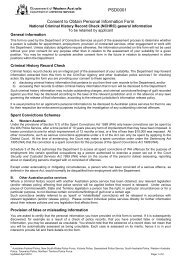
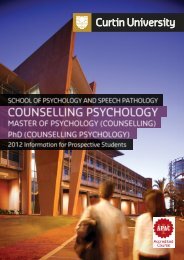
![Mental health commission report July 2010 - June 2011 [.pdf]](https://img.yumpu.com/50755705/1/184x260/mental-health-commission-report-july-2010-june-2011-pdf.jpg?quality=85)
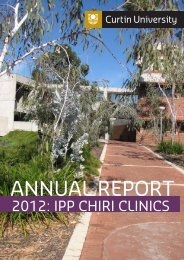
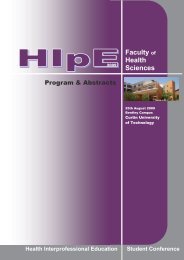
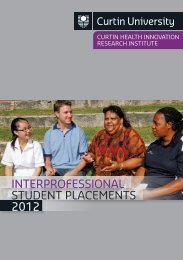
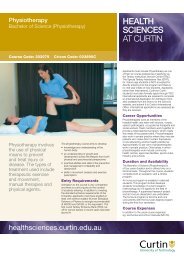
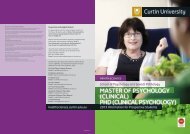
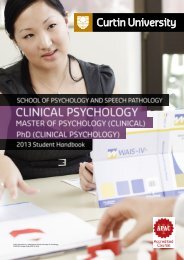

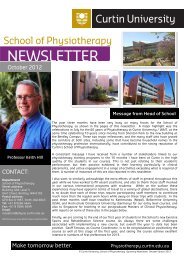
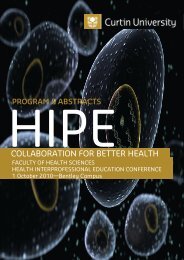
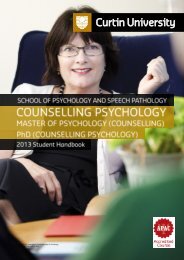
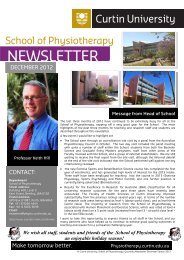
![2007 Annual Report [.pdf] - Health Sciences - Curtin University](https://img.yumpu.com/44476724/1/184x260/2007-annual-report-pdf-health-sciences-curtin-university.jpg?quality=85)